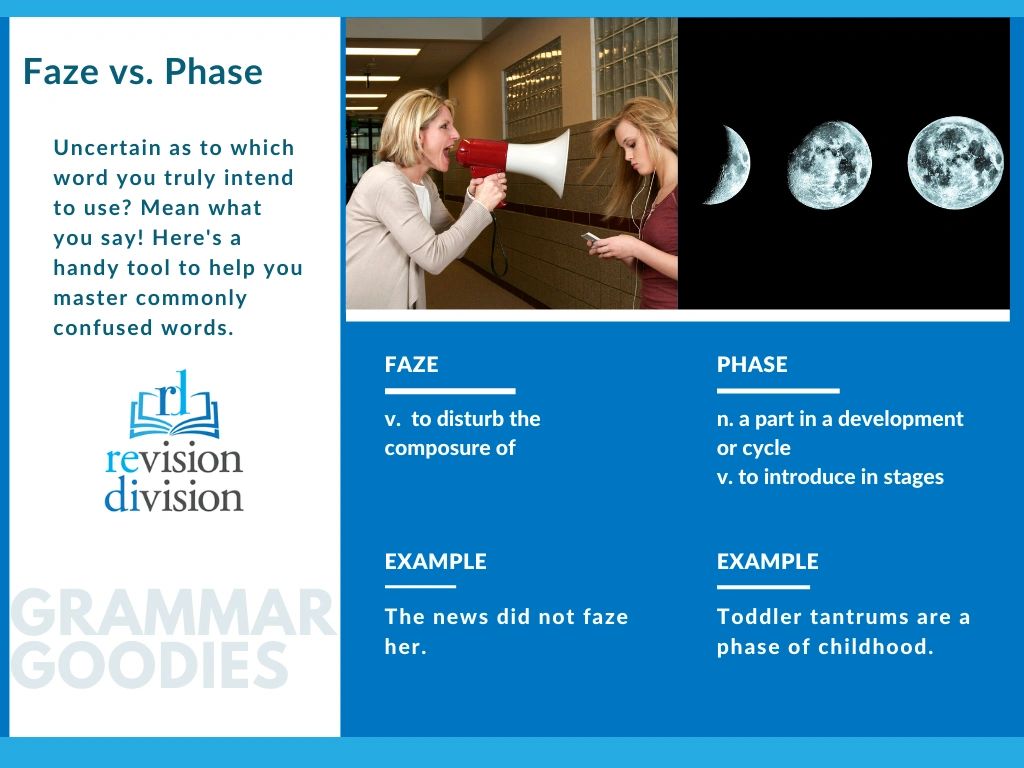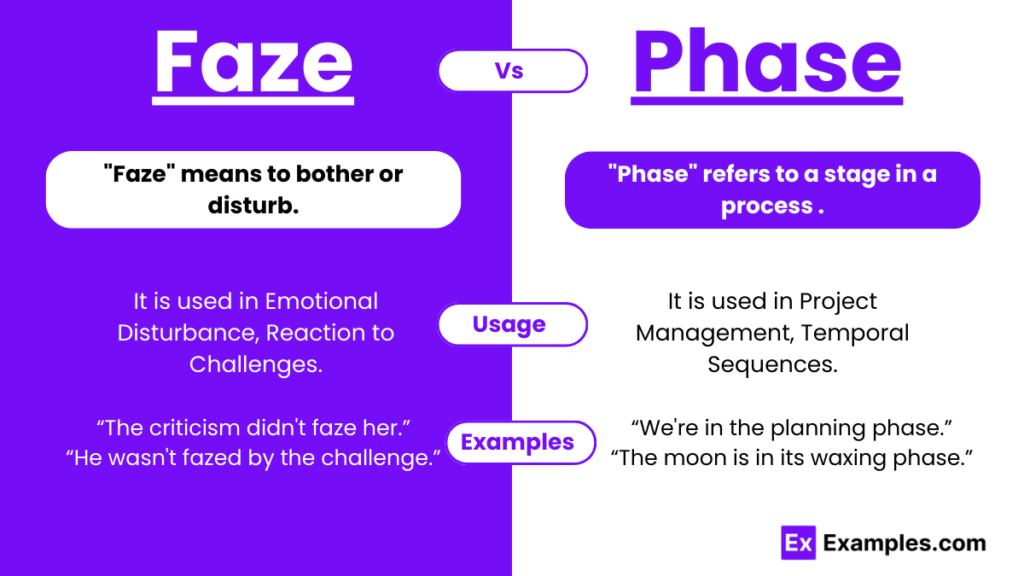In the English language, words that sound alike can be confusing. “Phase” and “faze” are perfect examples.
Understanding the difference between “phase” and “faze” is crucial for clear communication. These two words may sound similar, but they have distinct meanings and uses. “Phase” refers to a stage in a process, like phases of the moon or a project phase.
On the other hand, “faze” means to disturb or unsettle someone. Mixing them up can lead to misunderstandings. In this blog post, we’ll explore the meanings, usage, and examples of “phase” and “faze” to help you use them correctly. Let’s dive into the details and clear up the confusion between these commonly mixed-up words.

Introduction To Phase And Faze
People often mix up “phase” and “faze”. They look and sound alike. Yet, they have different meanings. “Phase” means a stage or step in a process. “Faze” means to disturb or upset someone. It’s easy to see why people confuse them. But, it’s important to use the right word.
Knowing the difference between “phase” and “faze” helps in clear communication. Using the correct word shows good language skills. It also prevents misunderstandings. For example, saying “He is in a tough phase” means he is in a difficult stage. Saying “He is not fazed” means he is not disturbed. Understanding these words can make conversations clearer and more precise.
Definition Of Phase
A phase is a stage in a process. It often refers to stages in scientific experiments. For example, water has three phases: solid, liquid, and gas. Each phase has different properties.
In everyday life, a phase can mean a period. For example, “She is in a reading phase.” It is a time when someone does something often. Phases can be short or long.
Definition Of Faze
“Faze” means to disturb or unsettle someone. Unlike “phase,” which refers to a stage in a process, “faze” impacts emotions.
Psychological Context
Faze means to disturb or upset someone. It affects the mind and emotions. When something fazes a person, they feel uneasy. This can cause stress or worry. The person may lose focus. They may find it hard to stay calm.
Everyday Usage
In daily life, faze means to bother. If a loud noise does not faze you, you stay calm. If a test fazes you, you feel nervous. Faze often relates to emotions. People say, “That does not faze me,” to show they are not worried.
Historical Origins
“Phase” and “faze” come from different origins. “Phase” has roots in Greek, meaning appearance or stage. “Faze” comes from an Old English word, “fesian,” meaning to frighten or disturb.
Etymology Of Phase
The word phase comes from Latin. It originally meant “an appearance.” This word has roots in Greek too. In Greek, it means “to show” or “to appear.” Over time, phase started to mean a stage in a process.
Etymology Of Faze
The word faze is more recent. It comes from Middle English. It was used to mean “to frighten” or “to disturb.” The word evolved. Now, it means to bother or to upset someone.
Usage In Sentences
The words “phase” and “faze” often confuse people. “Phase” refers to a stage in a process. “Faze” means to disturb or unsettle someone.
Examples Of Phase
A caterpillar goes through many phases to become a butterfly.
This project is in its final phase.
The moon has different phases each month.
Examples Of Faze
The loud noise didn’t faze her.
His rude comments did not faze me.
She wasn’t fazed by the storm.
Common Mistakes
Phase means a stage or step in a process. Faze means to disturb or upset someone. Many people mix these words up. They may write “faze” when they mean “phase”. This can make sentences confusing. To avoid this mistake, remember:
- Phase = step in a process.
- Faze = to disturb or upset.
Read your sentence out loud. Does it make sense with “phase”? Does it make sense with “faze”? If not, switch the word. Use a dictionary to check meanings. Practice writing sentences with both words. Over time, you will get better. This will help you avoid mistakes.
Cultural References
The word phase is often used in movies and books. Many characters go through different phases in their lives. For example, Harry Potter had a phase of learning magic. In music, bands may change their style in different phases of their career. The Beatles had a rock phase and later a psychedelic phase. Phases show growth and change.
The term faze means to disturb or bother someone. In TV shows, a hero may not be fazed by danger. This shows their bravery. In sports, players try to faze their opponents. They might use tricks or taunts. Sometimes, people say they are not fazed by criticism. It shows they are strong and confident.


Conclusion
Understanding “phase” versus “faze” is crucial for clear communication. Remember, “phase” refers to a stage or period. “Faze” means to disturb or bother. Use these words correctly to sound more professional. Practice makes perfect. So, keep writing and reading to reinforce your knowledge.
Small steps lead to big improvements. Stay confident in your learning journey.

